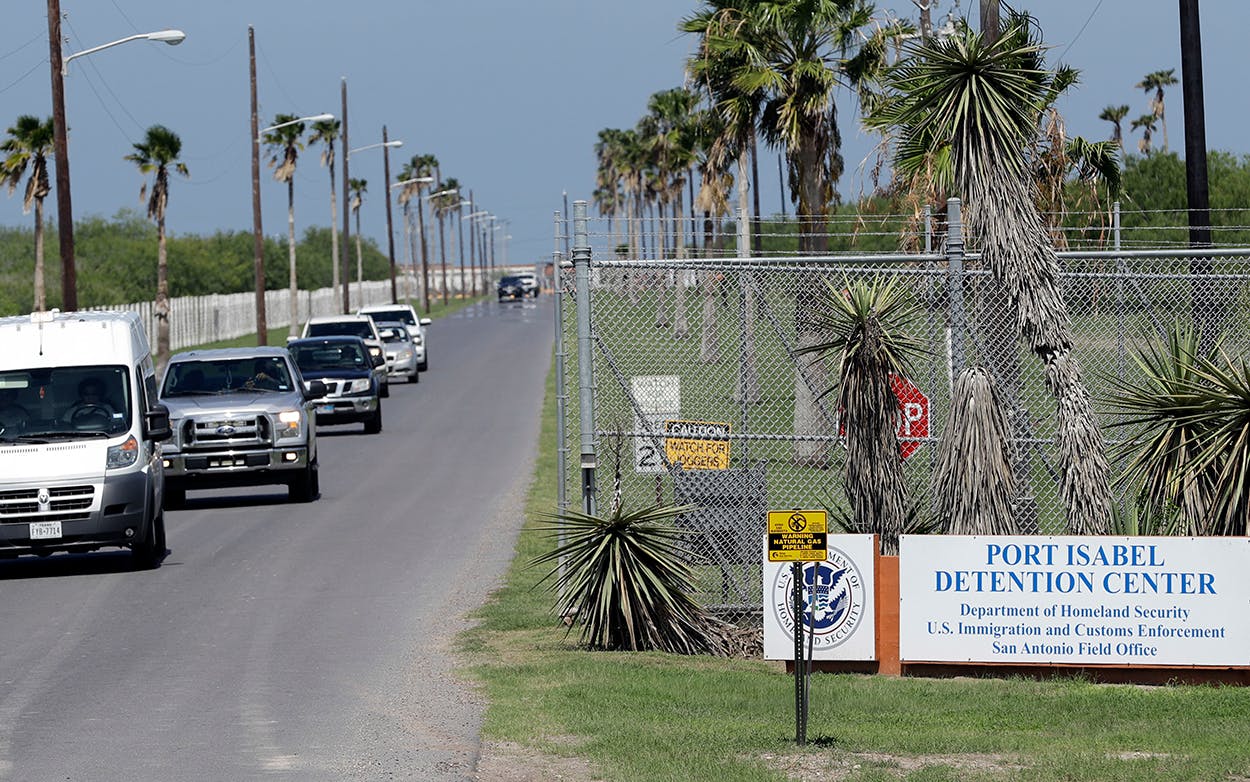The Honduran woman entered the United States illegally in June and was immediately detained by border agents and sent to the Port Isabel Detention Center in South Texas. A U.S. Border Patrol agent took the woman’s nine-year-old daughter—and that’s when she met an officer who immigrants in the facility had nicknamed the “deporter.”
“He called me in to sign my deportation papers a couple days after I was told I did not qualify for asylum,” the woman, who is only identified as D.P., said in a sworn affidavit. “I told him I was not signing anything until I had my daughter with me. (Redacted) started yelling at me saying, ‘You will sign the papers because you said you did not want to see a judge. Don’t you understand that we don’t want you in this country? You are all ignorant and keep coming.’”
The woman’s story is one of the most harrowing examples given by two immigrant advocate groups in a complaint filed this week with the Department of Homeland Security. The groups allege that U.S. border and immigration agents regularly abused migrants separated from their children at the border earlier this year—often in attempts to coerce them into agreeing to leave the country. The groups are asking the agency’s civil rights division and inspector general to investigate the allegations. “Together these practices have resulted in not only the tremendous suffering of children, and parents who have been kept apart, detained, and subjected to abusive, inhumane treatment, but also the involuntary, forced return of hundreds of people to grave dangers, including risk of death. As a nation we cannot tolerate such abuses in violation of our laws and we urge you to take immediate action to correct the situation,” the complaint said.
DHS did not immediately respond to a request for comment on the complaint, which was filed by the American Immigration Council and the American Immigration Lawyers Association. The complaint draws on the stories of 13 parents, all who either crossed the border in Texas or were held at an immigration detention facility in the state, AIC officials said. The complaint asks for investigations by DHS’s Office for Civil Rights and Civil Liberties, Cameron Quinn, and its acting inspector general, John V. Kelly. The complaint cites repeated examples of parents being kept in unsafe or unsanitary conditions, being denied information about their children or being told they were being put up for adoption, as well as being held in solitary confinement and being pressed by immigration agents to sign forms that would lead to them being deported.
The Honduran woman said she and other parents desperately sought information about their children while at Port Isabel, which is run by Immigration and Customs Enforcement. “When we asked the guards for our kids they said it would be better if we never saw them again and that we should not try to seek asylum and should just go back to our countries alone. Some of the guards continued to say they knew nothing about where our kids were, while others told us they had already been adopted. I could not think about anything else except my daughter. I was constantly worried and wanted to know if she was safe,” she said in the declaration.
At some point in July, mothers being held at Port Isabel learned that a White House representative—who isn’t identified in the documents—was touring the detention center. Though they were warned by guards not to communicate with the representative, about fifteen mothers attempted to plead their case, D.P. said. “We said that we were the separated mothers, we had not been able to speak with our kids in over a month, and that none of us have information about where our kids are. The representative told us that he would do everything possible to help them and that we should behave well, to calm down, and to cooperate,” she said. The mothers were quickly punished by ICE detention officers, she said. “I was handcuffed and put in solitary confinement for ten days. I was put in a dark room, so I did not know when it was day or night. I was not given food or water for about three days. After about three days I was given bread. I guessed it was about three days because I could hear different voices when the guards were changing their shifts and they were speaking to each other in Spanish. I was handcuffed for five days and had to eat and go to the bathroom in this way. They did not give me toilet paper. I felt desperate and depressed.”
The complaint also discusses allegations that at least seven parents were reunited with their children in late July at the ICE detention center in El Paso, only to be separated again a short while later because they refused to sign forms saying they wished to be reunited with their children. The parents said they wanted their children to stay in the United States while pursuing their own asylum claims. “By pre-selecting Option 1 (agreeing to deportation) on the Election Form, refusing to permit parents to select any other option, and screaming at any parent who disagreed, ICE agents violated the due process rights of these parents. Forcing a parent to sign a pre-selected form does not comport with due process as it does not allow for an affirmative, knowing, or voluntary decision by the parent,” the complaint said.
Benjamin Johnson, the executive director of AILA, said the complaints offer DHS a chance to prove it can police itself. “The agency has to look itself in the mirror and we have to determine to what degree can it effectively (oversee) behavior that happens within the agency,” he said in a media conference call on Thursday. “So this is an important piece of determining the reforms that are needed within the agency and the agency’s ability to address these concerns internally.”
- More About:
- Illegal Immigration
- Family Separation






